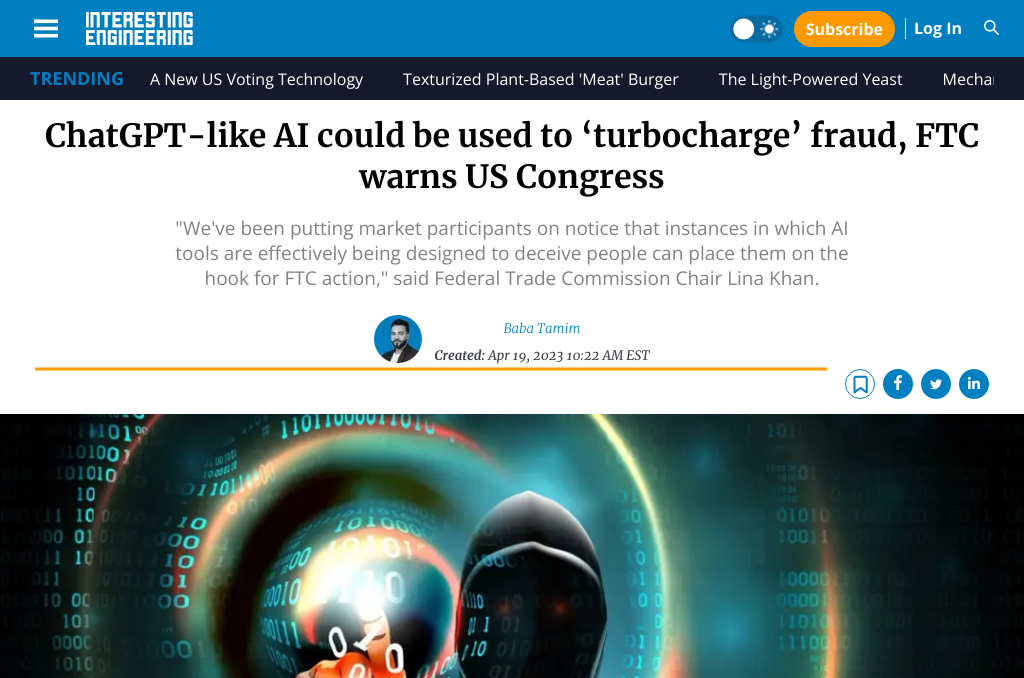The US government is seeking input from AI stakeholders on regulatory policies that would support the development of AI audits, assessments, certifications, and other methods of providing reliable evidence about the safety, trustworthiness, and effectiveness of AI systems. The National Telecommunications and Information Administration (NTIA), an agency within the federal Department of Commerce, recently issued a request for comments (RFC) regarding artificial intelligence (AI) accountability.[0] The NTIA’s goal is to develop a strong AI assurance and accountability ecosystem.[0] The RFC seeks input on self-regulatory and regulatory policies that would assure external stakeholders that AI systems are legal, effective, ethical, safe, and otherwise trustworthy. The NTIA intends to draft and issue a report on AI accountability policy “focusing especially on the AI assurance ecosystem,” which may include recommendations that will shape the federal government’s strategy for AI policymaking.
The heads of the Justice Department’s Civil Rights Division, the Consumer Financial Protection Bureau, the Federal Trade Commission, and the Equal Employment Opportunity Commission issued a joint statement stating that AI and other automated systems are regulated by existing laws meant to protect Americans against discrimination in the workplace.[1] The statement comes amid growing conversations about the need for new rules targeting AI systems.[2]
However, the Federal Trade Commission (FTC) Chair, Lina Khan, has warned that modern AI technologies like ChatGPT can be used to “turbocharge” fraud, leading to consumer harms, including fraud and scams.[3] During a Congressional hearing aimed at safeguarding consumers from fraudulent and misleading practices, Khan and other commissioners cautioned House representatives about the potential dangers associated with AI technologies.[4] “AI presents a whole set of opportunities but also presents a whole set of risks,” Khan told the House representatives.[5] “We’ve already seen ways in which it could be used to turbocharge fraud and scams, and we won’t hesitate to use the full scope of our legal authorities to protect Americans from these threats.[6] The laws on the books do not provide any exemption for AI.[6]
Guidelines for the use of AI are being established by U.S. lawmakers and regulators. Senate Majority Leader Chuck Schumer is building a framework in partnership with AI experts that he expects to file as legislation soon.[6] There is reason to believe that some type of AI regulatory regime will be put in place in the U.S. Clients should expect activity in both the regulatory and legislative space over the next two years on AI. Clients have the chance to share their experiences and express their concerns regarding the advantages and disadvantages of potential regulations related to AI by responding to the RFC. Additionally, this provides an opportunity for them to provide information to regulators.[0]
The NTIA’s RFC seeks input on self-regulatory and regulatory policies that would assure external stakeholders that AI systems are legal, effective, ethical, safe, and otherwise trustworthy. The NTIA intends to draft and issue a report on AI accountability policy “focusing especially on the AI assurance ecosystem,” which may include recommendations that will shape the federal government’s strategy for AI policymaking.
0. “NTIA Request for Comments on AI Accountability | Cozen O’Connor – JDSupra” JD Supra, 20 Apr. 2023, https://www.jdsupra.com/legalnews/ntia-request-for-comments-on-ai-3474450/
1. “Biden administration regulators warn AI, employee surveillance tools could ‘turbocharge’ fraud and discrimination” MarketWatch, 25 Apr. 2023, https://www.marketwatch.com/story/biden-administration-regulators-warn-ai-employee-surveillance-tools-could-turbocharge-fraud-and-discrimination-2a94175c
2. “Federal agencies promise action against ‘AI-driven harm’” TechTarget, 25 Apr. 2023, https://www.techtarget.com/searchcio/news/365535486/Federal-agencies-promise-action-against-AI-driven-harm
3. “FTC chair Lina Khan warns AI could ‘turbocharge’ fraud and scams” News8000.com – WKBT, 21 Apr. 2023, https://www.news8000.com/lifestyle/technology/ftc-chair-lina-khan-warns-ai-could-turbocharge-fraud-and-scams/article_3faa0c91-18b6-5a80-869e-e9db1b3d630d.html
4. “AI tech like ChatGPT can be used to aturbocharge fraud: FTC’s Lina Khan” The Siasat Daily, 19 Apr. 2023, https://www.siasat.com/ai-tech-like-chatgpt-can-be-used-to-aturbocharge-fraud-ftcs-lina-khan-2571925/
5. “ChatGPT-like AI could be used to ‘turbocharge’ fraud, FTC warns US Congress” Interesting Engineering, 19 Apr. 2023, https://interestingengineering.com/culture/chatgpt-ai-pose-risk-of-fraud
6. “Federal agencies commit to fighting AI-powered discrimination and fraud” Washington Examiner, 25 Apr. 2023, https://www.washingtonexaminer.com/policy/technology/federal-agencies-artificial-intelligence-discrimination
